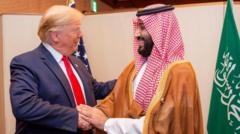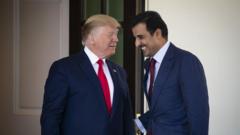The relationship between Israeli Prime Minister Benjamin Netanyahu and President Trump is showcasing signs of discord as Trump embarks on a Middle East visit. Their contrasting positions on military action against Iran highlight a significant shift from their previously synchronized political stances.
Shifting Alliances: Trump and Netanyahu's Diverging Paths

Shifting Alliances: Trump and Netanyahu's Diverging Paths
As President Trump heads to the Middle East, his previously united front with Prime Minister Netanyahu seems to be faltering amidst critical differences in policy regarding Iran and military action.
As President Trump prepares for his Middle East trip, the political landscape reveals a notable rift with Israeli Prime Minister Benjamin Netanyahu. Initially, the two leaders shared a harmonious alignment, evident during their meetings at the White House, where they both expressed concern over Iran’s nuclear ambitions. Netanyahu even praised Trump for his forthrightness regarding sensitive issues, which others shy away from addressing.
However, recent developments suggest a divergence in their strategies. In an April meeting, Trump focused on topics unrelated to Israel, leaving Netanyahu relatively silent, a stark contrast to their earlier, more unified exchanges. Trump has since expressed reluctance to undertake military action to curtail Iran's nuclear potential, opting instead for diplomatic negotiations—much to Netanyahu's dismay.
Netanyahu has been vocal about his concerns, warning that a poorly negotiated deal with Iran may yield worse consequences than no agreement at all. The shift in dynamics raises questions about the future of U.S.-Israel relations, as both leaders confront the complexities of regional security amidst growing tensions. As this situation unfolds, it highlights the intricate balance between alliance and disagreement in global geopolitics.




















